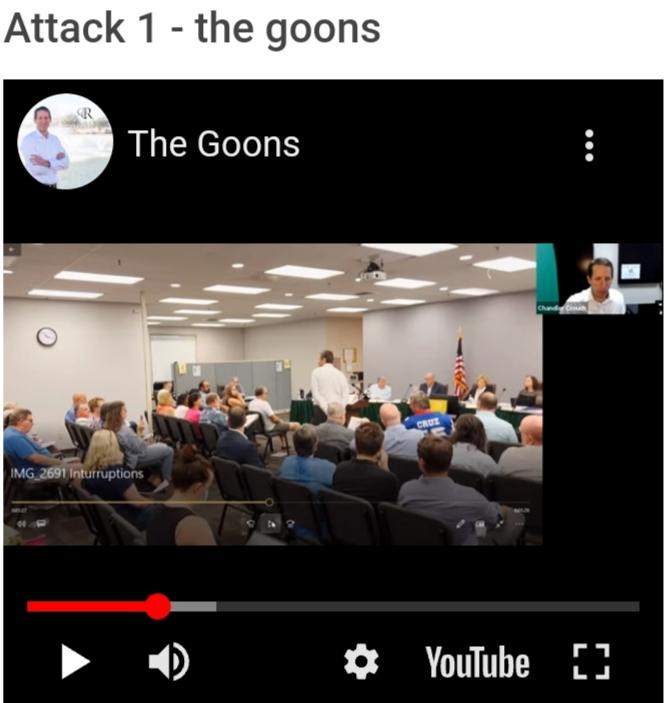Speaking at a recent meeting, a board member for TAD (Tarrant Appraisal District), Rich DeOtte, argued to release the findings from an August investigation publicly. In the report’s summary, attorneys with the Texas law firm Walsh Gallegos concluded that TAD’s director of residential appraisal did not break any laws when he allegedly used government resources last year to file complaints with the Texas Department of Licensing and Registration (TDLR) against a local Realtor.
The residential appraisal director’s “actions were taken independently, albeit apparently within the course and scope of his employment,” reads the page “Legal Conclusions.”
The targeted Realtor, Chandler Crouch, volunteers his time helping locals protest skyrocketing property valuations. Residential appraisal director Randy Armstrong alleged Crouch was appraising homes for far lower values than what the Realtor sold them for. Armstrong also alleged that Crouch rarely appeared in person to represent his clients at TAD headquarters. Armstrong’s critics told me the residential appraisal director was simply fed up with the extra work Crouch’s volunteerism created for TAD staffers.
Over the summer as news of Armstrong’s actions spread, the appraisal district become the target of unprecedented backlash and public protests from Tarrant County residents who viewed the allegations against Crouch as political and petty. DeOtte, based on his reading of the full report, now alleges that Armstrong and possibly other TAD leaders broke the law.
The board “only had that full report for a day and a half,” DeOtte said during the recent meeting, referring to what he saw as inadequate time to vet the document. The report findings “had a dramatic effect on me. I’d like to refer this to the district attorney’s office to see if there was official oppression that occurred. I may be able to release that report on my own.”
Texas’ official oppression laws that outlaw government officials from misusing government property or resources, including law enforcement, to harm or defraud a person or people could be tied to Armstrong’s use of government resources to research and file complaints against Crouch or the mid-August arrest by several sheriff’s deputies of citizen journalist Manuel Mata, one of several individuals to sign a TDLR complaint against TAD leadership in response to Armstrong’s attacks on Crouch.
Mata’s arrest for allegedly assaulting a sheriff’s deputy occurred after Mata and another government watchdog, Thomas Torlincasi, were invited to a taped-off area for local press in a large meeting room at TAD’s headquarters in northeast Tarrant County. Mata planned to livestream the meetings that were historically only recorded via audio.
Based on livestream footage from that day, Torlincasi stepped outside the taped-off area that already held several reporters to interview TAD board members, which prompted TAD communications officer Ricardo Aguilera to approach him.
“You’ve already been warned once,” Aguilera told Torlincasi without explaining the first warning.
Soon after, Aguilera approached J.D. Thomas, a sheriff’s deputy with a history of making false arrests (“Damage Control,” Aug. 31), who then directed several of his colleagues to push Mata out of the meeting room.
Speaking at a recent county commissioners court meeting, Daniel “Joe” Bennett, a vocal critic of TAD dealings, told the commissioners that the timing of the arrest is suspect.
Mata was “arrested August 12,” Bennett said during the meeting’s public comments section. Bennett went on to wonder if the watchdog was arrested for signing “this [TDLR] complaint against the chief appraiser Jeff Law and head of residential,” Armstrong.
A TAD spokesperson said in an email that TAD cannot release the report due to attorney/client privilege.
“TAD has sought advisement from the Texas Attorney General on the release of the full report,” the spokesperson added.
In an email, Crouch said TAD’s decision to conceal the full report shows that the appraisal district is not committed to government transparency.
“I wonder what TAD is trying to hide by not releasing that full report?” Realtor Crouch said.
If there is legally sensitive information, he added, TAD staffers can easily redact that material.
While the contents of the full report remain concealed, a confidential source gave me the Walsh Gallegos law firm invoices that detail the cost of the internal investigation.
Based on the invoices filed in August and September, Walsh Gallegos billed TAD around $25,000 for investigating the TDLR complaints, writing the report, and publishing the recent summary. Walsh Gallegos attorney Todd Clark, based on the invoices, billed $335 an hour for his nearly six-hour commute to Fort Worth from just north of Austin and back, which cost taxpayers $1,900 per roundtrip.
“Given the substance of the matter and the particular expertise required to fully investigate and produce such reports,” the TAD spokesperson said, the $25,000 fee “does not appear to be excessive.”
The recent legal summary isn’t the first time Walsh Gallegos lawyers have run up a large bill while protecting TAD interests. In 2018, TAD paid the law firm $15,000 to sue the state attorney general to halt the release of a whistleblower complaint about corruption and retaliation against employees at the appraisal district (“Shining a Light on Tad,” June 2021). The confidential source who provided the invoices alleges TAD has a history of hiring Walsh Gallegos for nefarious reasons, the most recent one being the whitewashing of Armstrong’s actions.
Based on an early 2021 TAD board meeting agenda, Walsh Gallegos attorney Clark recommended TAD’s board approve new personnel policies and procedures language that replaced the word “prohibited” with “discouraged” when describing TAD’s policy against co-worker dating. TAD’s board ultimately decided to reject Clark’s recommendation.
Our magazine’s past reporting found that around 15% of TAD’s employees are related. Nepotism is generally prohibited in government because it creates the appearance that some employees are hired due to familial connections instead of merit.
When TAD chief appraiser Law was hired in 2008, his hiring violated previous nepotism guidelines. Law’s first cousin, David Law, was already the longtime head of commercial appraisals when Jeff came on board. Upper-level TAD administrators earn between $150,000 and $170,000 a year, based on past disclosures during TAD board meetings.
Perhaps most alarming about the Walsh Gallegos investigation summary are the allegations against Realtor Crouch.
Armstrong’s allegations “describe genuine issues implicating potential violations of license requirements,” part of the Walsh Gallegos summary reads without providing evidence. “Tax consultants are prohibited from engaging in any activity that constitutes dishonesty, fraud, or gross incompetence.”
The TAD spokesperson said the appraisal district has never alleged Crouch committed fraud.
“Any allegations of this nature were made during public comment at TAD board meetings from private citizens who have no affiliation with TAD,” the spokesperson said.
The spokesperson added that Walsh Gallegos was an appropriate choice for a third-party perspective.
“The Walsh Gallegos firm is a very reputable and qualified firm,” the spokesperson said.
Through ChandlerCrouch.com, Crouch alleges a coordinated effort by unnamed property tax protestors with possible TAD connections to discredit him during TAD’s August board meeting.
“People have been paid to drive down from Oklahoma to falsely accuse me of falsifying documents and committing crimes,” Crouch alleged. “Someone does not want property owners to get help from me for free. As we pursue uncovering the truth, I hope we don’t find it involved TAD leadership.”
Throughout the video posted on his website, Crouch refers to the allegedly hired complainants as “goons” for hire.












